Unit 8 Lesson 45 Different Manners 课件(28张PPT)
文档属性
| 名称 | Unit 8 Lesson 45 Different Manners 课件(28张PPT) | 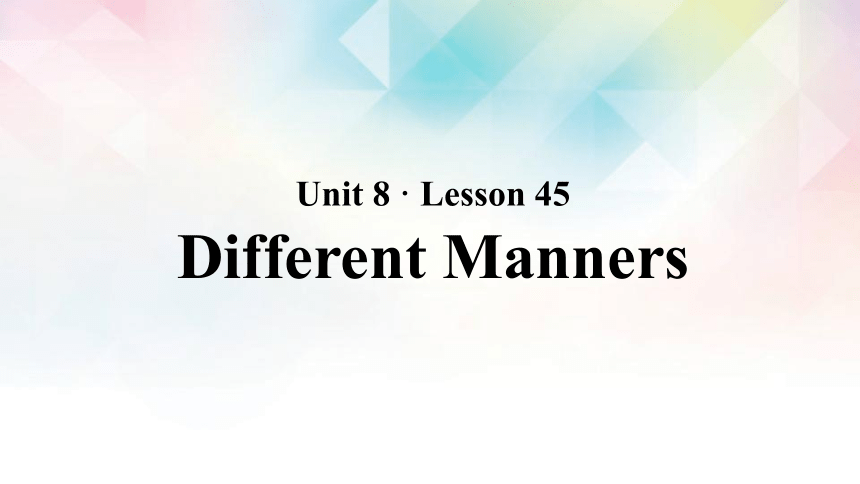 | |
| 格式 | pptx | ||
| 文件大小 | 1.7MB | ||
| 资源类型 | 教案 | ||
| 版本资源 | 冀教版 | ||
| 科目 | 英语 | ||
| 更新时间 | 2020-05-11 11:43:45 | ||
图片预览

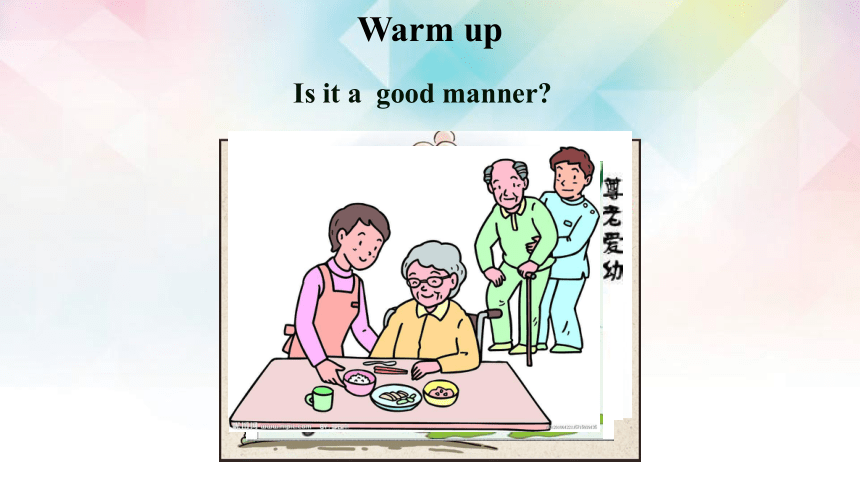

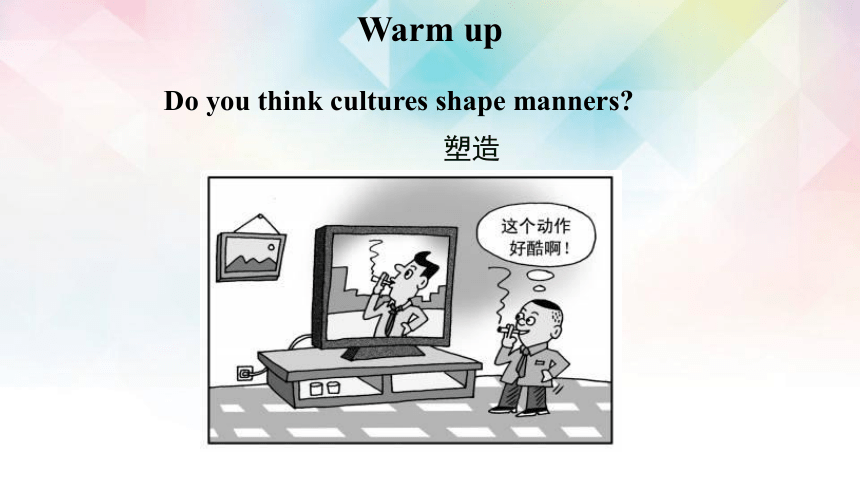

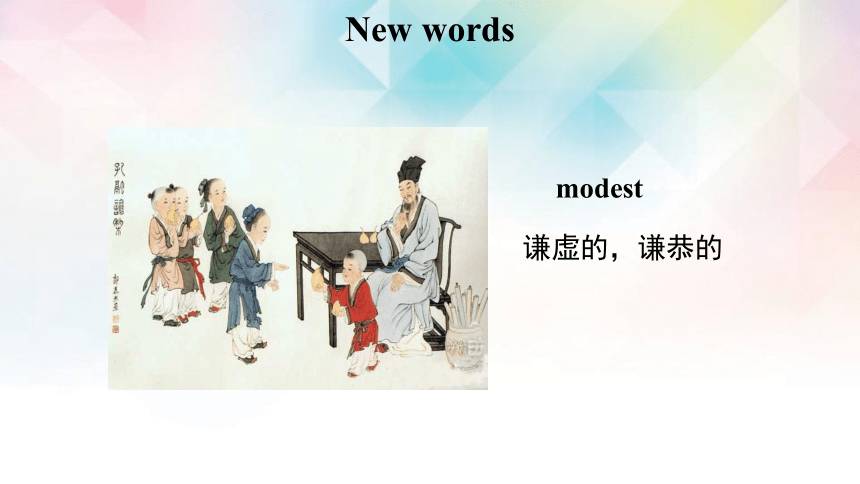

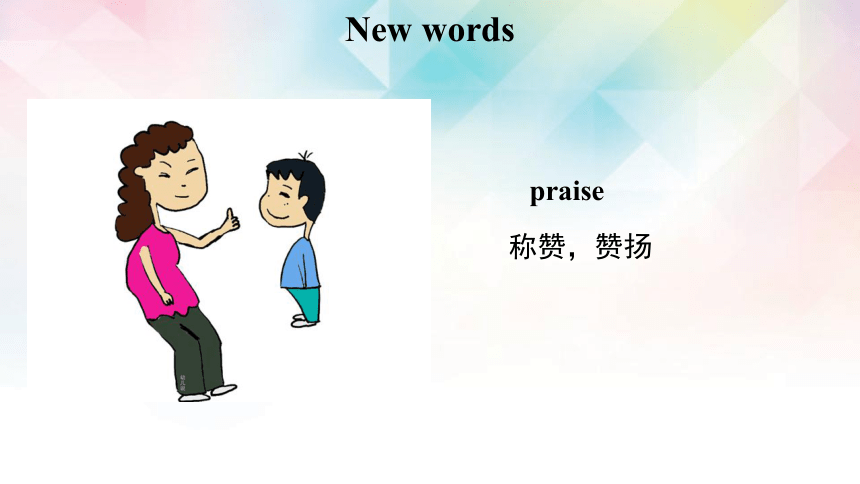

文档简介
(共28张PPT)
Unit 8 · Lesson 45
Different Manners
Is it a good manner
Warm up
In your opinion, what are good manners
Warm up
Do you think cultures shape manners
塑造
Warm up
manners
礼仪,礼貌,习俗
New words
modest
谦虚的,谦恭的
New words
virtue
美德
New words
praise
称赞,赞扬
New words
private
私人的,私有的
New words
elderly
较老的,
上了年纪的
New words
guest
客人
New words
extra
额外的,另外的
New words
tip
给小费
New words
waiter
男服务员
New words
waitress
女服务员
New words
Read the lesson and match the behaviours with the correct countries.
China
Canada
asking an adult's age
giving a tip to waiters and hotel workers
sharing the cost of a meal in a restaurant
putting food on a guest'splate
Presentation
manner的意思是“方式;态度;习惯”。
e.g. My classmate spoke to me in a proper manner.
我的同学以恰当的方式跟我说话。
Her manner showed her happy.
她的态度显示出她的快乐。
表示“礼貌,礼仪;风度;规矩;风俗;生活方式”时,要用manners。
e.g. You should learn some foreign manners.
你应该学些外国礼仪。
Language points
sound like的意思是“听起来像”。sound是系动词。
e.g. The man speaks English sound like an American.
那个男人口语听起来像美国人。
sound可作名词,意为“声音;声响”。
e.g. Where is the sound from
这个声音来自哪里?
sound后还可跟as if 从句。
e.g. She sounds as if she were a five-year-old girl.
她说话的声音像个十岁女孩。
Language points
take turns的意思是“依次,轮流”。表达“轮流做某事”可以用take turns doing sth.,也可以用take turns to do sth.,还可以搭配介词at, in, on或about。
e.g. Our took turns to take care of my grandparents.
我们家人轮流照顾我的祖父母。
We take turns in cleaning the classrooms.
我们轮流打扫教室。
Language points
although, though引导的让步状语从句:
although是连词,相当于though,意为“虽然;即使;纵然”,引导让步状语从句。
需要注意的是,在汉语的表达中,我们经常会说,“尽管 / 虽然……,但是……”,而在英语中,although / though和but是不能同时使用的。但可以用yet 或 still 表然而,可是之意。
e.g. Though / Although it has been rain, (yet) we haven’t found an umbrella.
虽然下雨了,但是我们还没有找到雨伞。
Though her father is have a cold, (yet) he works hard.
Language points
praise sb. for sth. 因... ...赞扬某人。
eg. The teacher praised Mike for cleaning the window.
因为麦克擦窗户,老师表扬了他。
both... and..连接平衡结果,连接主语时谓语用复数。
eg. Both you and he are students.
neither... nor..., either ... or..., not only ... but also...谓语遵循就近原则。
eg. Neither you nor he is a student.
Language points
Match and complete the sentences.
Note that we should not use “although / though” and “but” together in the same sentence.
Although people have different cultures and customs,
but he has already made many friends there.
Brain hasn’t been to China,
they have the same feelings.
He has been at the new school for only a few days,
he still feels lonely.
Though Liu Feng has many friends in America,
but he knows a lot about our country.
Language points
Fill in the blanks with the words or phrases in the box.
pay for praise take turns modest private
1. We should ______ little Debbie for her courage.
2. It’s a long way. We can __________ driving.
3. They asked him to ________the damage, but he refused.
4. Don’t talk about other people’s ________ things. It’s not polite.
5. Jack is a ________ man who is admired by many people.
praise
take turns
pay for
private
modest
Practice
What cultural differences, besides the ones already discussed, have you noticed between China and English–speaking countries Share your ideas with your classmates.
Practice
Write down the ideas.
Practice
Enjoy the story: What about the saying about study
For the hard-working, a week has seven days; for the lazy, seven tomorrows.
Practice
1.Listen and read.
2.Finish exercises of this lesson.
Homework
再 见
Unit 8 · Lesson 45
Different Manners
Is it a good manner
Warm up
In your opinion, what are good manners
Warm up
Do you think cultures shape manners
塑造
Warm up
manners
礼仪,礼貌,习俗
New words
modest
谦虚的,谦恭的
New words
virtue
美德
New words
praise
称赞,赞扬
New words
private
私人的,私有的
New words
elderly
较老的,
上了年纪的
New words
guest
客人
New words
extra
额外的,另外的
New words
tip
给小费
New words
waiter
男服务员
New words
waitress
女服务员
New words
Read the lesson and match the behaviours with the correct countries.
China
Canada
asking an adult's age
giving a tip to waiters and hotel workers
sharing the cost of a meal in a restaurant
putting food on a guest'splate
Presentation
manner的意思是“方式;态度;习惯”。
e.g. My classmate spoke to me in a proper manner.
我的同学以恰当的方式跟我说话。
Her manner showed her happy.
她的态度显示出她的快乐。
表示“礼貌,礼仪;风度;规矩;风俗;生活方式”时,要用manners。
e.g. You should learn some foreign manners.
你应该学些外国礼仪。
Language points
sound like的意思是“听起来像”。sound是系动词。
e.g. The man speaks English sound like an American.
那个男人口语听起来像美国人。
sound可作名词,意为“声音;声响”。
e.g. Where is the sound from
这个声音来自哪里?
sound后还可跟as if 从句。
e.g. She sounds as if she were a five-year-old girl.
她说话的声音像个十岁女孩。
Language points
take turns的意思是“依次,轮流”。表达“轮流做某事”可以用take turns doing sth.,也可以用take turns to do sth.,还可以搭配介词at, in, on或about。
e.g. Our took turns to take care of my grandparents.
我们家人轮流照顾我的祖父母。
We take turns in cleaning the classrooms.
我们轮流打扫教室。
Language points
although, though引导的让步状语从句:
although是连词,相当于though,意为“虽然;即使;纵然”,引导让步状语从句。
需要注意的是,在汉语的表达中,我们经常会说,“尽管 / 虽然……,但是……”,而在英语中,although / though和but是不能同时使用的。但可以用yet 或 still 表然而,可是之意。
e.g. Though / Although it has been rain, (yet) we haven’t found an umbrella.
虽然下雨了,但是我们还没有找到雨伞。
Though her father is have a cold, (yet) he works hard.
Language points
praise sb. for sth. 因... ...赞扬某人。
eg. The teacher praised Mike for cleaning the window.
因为麦克擦窗户,老师表扬了他。
both... and..连接平衡结果,连接主语时谓语用复数。
eg. Both you and he are students.
neither... nor..., either ... or..., not only ... but also...谓语遵循就近原则。
eg. Neither you nor he is a student.
Language points
Match and complete the sentences.
Note that we should not use “although / though” and “but” together in the same sentence.
Although people have different cultures and customs,
but he has already made many friends there.
Brain hasn’t been to China,
they have the same feelings.
He has been at the new school for only a few days,
he still feels lonely.
Though Liu Feng has many friends in America,
but he knows a lot about our country.
Language points
Fill in the blanks with the words or phrases in the box.
pay for praise take turns modest private
1. We should ______ little Debbie for her courage.
2. It’s a long way. We can __________ driving.
3. They asked him to ________the damage, but he refused.
4. Don’t talk about other people’s ________ things. It’s not polite.
5. Jack is a ________ man who is admired by many people.
praise
take turns
pay for
private
modest
Practice
What cultural differences, besides the ones already discussed, have you noticed between China and English–speaking countries Share your ideas with your classmates.
Practice
Write down the ideas.
Practice
Enjoy the story: What about the saying about study
For the hard-working, a week has seven days; for the lazy, seven tomorrows.
Practice
1.Listen and read.
2.Finish exercises of this lesson.
Homework
再 见
同课章节目录
- Unit 7 Work for Peace
- Lesson 37 Don't Fight!
- Lesson 38 Making School a Better Place
- Lesson 39 The Dove and the Olive Branch
- Lesson 40 The UN—Power of Words
- Lesson 41 Jenny's Good Advice
- Lesson 42 Peace at Last
- Unit Review
- Unit 8 Culture Shapes Us
- Lesson 43 A Visit to Chinatown
- Lesson 44 Popular Sayings
- Lesson 45 Different Manners
- Lesson 46 Home to Many Cultures
- Lesson 47 Good Manners
- Lesson 48 Supper with the Bradshaws
- Unit Review
- Unit 9 Communication
- Lesson 49 Get Along with Others
- Lesson 50 Tips for Good Communication
- Lesson 51 What Could Be Wrong?
- Lesson 52 The Power of a Smile
- Lesson 53 Working in Groups
- Lesson 54 How Embarrassing!
- Unit Review
- Unit 10 Get Ready for the Future
- Lesson 55 Look into the Future
- Lesson 56 Manage Your Time
- Lesson 57 Best Wishes
- Lesson 58 Ms.Liu's Speech
- Lesson 59 Keep Your Choices Open
- Lesson 60 Get a Good Education
- Unit Review
